- Clone
- Poly5164 (See other available formats)
- Regulatory Status
- RUO
- Other Names
- Interleukin-22, IL-10-related T cell-derived inducible factor, IL-TIF
- Isotype
- Goat Polyclonal IgG
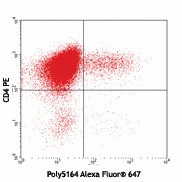
-

PMA/ionomycin-stimulated (5 hours) Th17 polarized CD4+ T cells (day 3) from C57BL/6 mouse lymph nodes surface stained with mouse CD4 (GK1.5) PE, then intracellular stained with Poly5164 Alexa Fluor® 647.
| Cat # | Size | Price | Quantity Check Availability | ||
|---|---|---|---|---|---|
| 516406 | 100 tests | $188.00 | |||
IL-22 is a cytokine structurally related to IL-10. Mouse IL-22 consists of 179 amino acids and has a predicted molecular weight of 20 kD. It is secreted primarily by Th17, Th1, Th2, lymphoid tissue inducer cells (LTi), and subsets of natural killer cells. It has been reported that aryl hydrocarbon receptor (AhR) expression is essential for the production of IL-22 by TCRγδ T cells. AhR activation increases Th17 polarization and induces IL-22 production. IL-22 functions by engaging the heterodimeric IL-22 receptor (IL-22R) complex, consisting of two receptor subunits, IL-22R1 and IL-10Rβ. IL-22 acts on nonhematopoietic tissue cells, such as epithelial cells of the digestive and respiratory systems and keratinocytes of the skin. IL-22 is involved in inflammatory processes such as dermal inflammation, psoriasis, inflammatory bowel disease, hepatitis, and Crohn’s disease. Moreover, it plays a critical role in mucosal immunity and the wound healing process.
Product Details
- Verified Reactivity
- Mouse
- Antibody Type
- Polyclonal
- Host Species
- Goat
- Immunogen
- Mouse IL-22, amino acids Leu34-Val179 (Accession# NM_016971), was expressed in E. coli.
- Formulation
- Phosphate-buffered solution, pH 7.2, containing 0.09% sodium azide and BSA (origin USA)
- Preparation
- The antibody was purified by affinity chromatography and conjugated with Alexa Fluor® 647 under optimal conditions.
- Concentration
- Lot-specific (to obtain lot-specific concentration and expiration, please enter the lot number in our Certificate of Analysis online tool.)
- Storage & Handling
- The antibody solution should be stored undiluted between 2°C and 8°C, and protected from prolonged exposure to light. Do not freeze.
- Application
-
ICFC - Quality tested
- Recommended Usage
-
Each lot of this antibody is quality control tested by intracellular immunofluorescent staining with flow cytometric analysis. For flow cytometric staining, the suggested use of this reagent is 5 µl per million cells in 100 µl staining volume or 5 µl per 100 µl of whole blood.
Alexa Fluor® and Pacific Blue™ are trademarks of Life Technologies Corporation.
View full statement regarding label licenses - Excitation Laser
-
Red Laser (633 nm)
- Application Notes
-
ELISA Capture: The purified Poly5164 antibody is useful as a capture antibody in a sandwich ELISA assay, when used in conjunction with the biotinylated Poly5164 antibody (Cat. No. 516407) as the detecting antibody and recombinant mouse IL-22 (Cat. No. 576209) as the standard.
In sandwich ELISA, Poly5164 has approximately 17% and 2% cross-reactivity with recombinant rat and human IL-22, respectively.
Flow Cytometry: The fluorochrome-labeled Poly5164 antibody is useful for immunofluorescent staining and flow cytometric analysis to identify IL-22-producing cells within mixed cell populations.
Note: For testing mouse IL-22 in serum, plasma or supernatant, LEGEND MAX™ Mouse IL-22 ELISA Kit (Cat. No. 436307 & 436308) is specially developed and recommended.
Note: The use of Iscove's Modified Dulbecco's Medium (IMDM) will result in better in vitro Th17 polarization.1 -
Application References
(PubMed link indicates BioLegend citation) -
- Veldhoen M, et al. 2009. J. Exp. Med. 206:43.
- Product Citations
-
- RRID
-
AB_2280206 (BioLegend Cat. No. 516406)
Antigen Details
- Structure
- A cytokine structurally related to IL-10 with a predicted molecular weight of 20 kD.
- Distribution
-
Th17, Th1, Th2, lymphoid tissue inducer cells (LTi), and subsets of natural killer cells.
- Function
- Acts on nonhematopoietic tissue cells, such as epithelial cells and keratinocytes, involved in inflammatory processes, mucosal immunity, and wound healing.
- Cell Type
- NK cells, Th1, Th17, Th2
- Biology Area
- Immunology
- Molecular Family
- Cytokines/Chemokines
- Antigen References
-
1. Martin B, et al. 2009. Immunity 31:321.
2. Liang SC, et al. 2006. J. Exp. Med. 203:2271.
3. Veldhoen M, et al. 2008. J. Exp. Med. 206:43.
4. Zheng Y, et al. 2007. Nature 445:648.
5. Dumoutier L, et al. 2000. J. Immunol. 164:1814.
6. Wolk K, et al. 2007. J. Immunol. 178:5973. - Gene ID
- 50929 View all products for this Gene ID
- UniProt
- View information about IL-22 on UniProt.org
Other Formats
View All IL-22 Reagents Request Custom Conjugation| Description | Clone | Applications |
|---|---|---|
| PerCP/Cyanine5.5 anti-mouse IL-22 | Poly5164 | ICFC |
| Purified anti-mouse IL-22 | Poly5164 | ELISA Capture |
| Alexa Fluor® 647 anti-mouse IL-22 | Poly5164 | ICFC |
| PE anti-mouse IL-22 | Poly5164 | ICFC |
| Biotin anti-mouse IL-22 | Poly5164 | ELISA Detection |
| APC anti-mouse IL-22 | Poly5164 | ICFC |
Compare Data Across All Formats
This data display is provided for general comparisons between formats.
Your actual data may vary due to variations in samples, target cells, instruments and their settings, staining conditions, and other factors.
If you need assistance with selecting the best format contact our expert technical support team.
-
PerCP/Cyanine5.5 anti-mouse IL-22
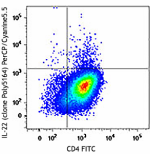
PMA/ionomycin-stimulated (6 hours) Th17 polarized BALB/c mou... -
Purified anti-mouse IL-22
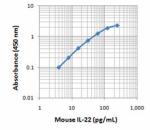
-
Alexa Fluor® 647 anti-mouse IL-22
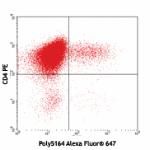
PMA/ionomycin-stimulated (5 hours) Th17 polarized CD4+ T cel... -
PE anti-mouse IL-22
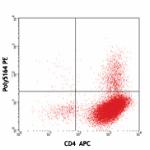
PMA/ionomycin-stimulated (5 hours) Th17 polarized CD4+ T cel... 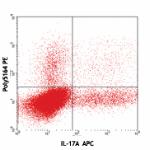
PMA/ionomycin-stimulated (5 hours) Th17 polarized CD4+ T cel... -
Biotin anti-mouse IL-22
-
APC anti-mouse IL-22
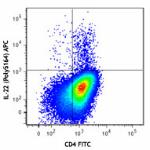
PMA/ionomycin-stimulated (5 hrs) Th17 polarized CD4+ T cells...
